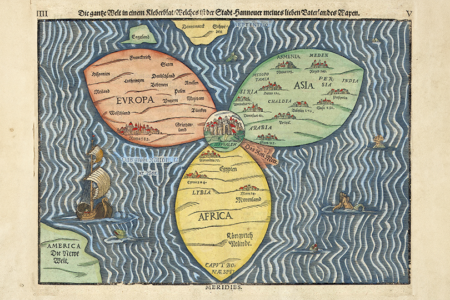The ‘Peace and Safety’ Test
Israel My Glory In Depth is a video interview series that explores the author’s motivation in writing their article.The prophecies of 1 Thessalonians 4—5 help explain why the Day of the Lord supports a pretribulational Rapture.
The Rapture of the church is a comforting doctrine for true believers in Jesus as we walk in a God-forsaken world. Some Christians, however, scoff at the very mention of a Rapture. After all, they say, the word rapture is not found in the Bible. They are wrong.
Although not present in the English translations, the term comes from the Latin and appears in the Latin translations of 1 Thessalonians 4:17: “Then we who are alive and remain shall be caught up together with them in the clouds to meet the Lord in the air. And thus we shall always be with the Lord.”
The words caught up capture the idea of a Rapture. Simply put, the Lord Jesus is coming back to receive His children and bring us up to Him in the clouds. This snatching away of His own starts the progression of the official end-times days.
Christians, nevertheless, still debate the timing of this event. The Friends of Israel Gospel Ministry holds to a pretribulational Rapture. Pretribulational means the Rapture will occur before the future seven-year Tribulation (see “What Is the 70th Week of Daniel?”)—a time of universal horror on Earth.
Other true believers hold a posttribulational position, placing the event at the Second Coming at the end of the Tribulation. A third group believes the Rapture will occur halfway through the Tribulation (midtribulational); and some hold to a Pre-Wrath Rapture, which places the Rapture somewhere within the second half of the Tribulation.
The key to understanding the correct timing is found in the Bible’s discussion of the Day of the Lord in 1 Thessalonians 5.
‘But Concerning . . .’
Chapter 5 opens with the words But concerning, which mark a new subject: “But concerning the times and the seasons, brethren, you have no need that I should write to you. For you yourselves know perfectly that the day of the Lord so comes as a thief in the night” (vv. 1–2).
In light of the chronological outline Paul followed throughout the book, the Rapture presented in chapter 4 precedes the Day of the Lord about to be reviewed in chapter 5.
Then, in 5:2, Paul reminded the Thessalonians about something they already knew: The Day of the Lord will come like a thief in the night, that is, unexpectedly and unannounced. Upon whom does it come? Upon unbelievers. Believers already will have been raptured.
According to 5:3, those on Earth will be crying, “Peace and safety!” Are they saying they do not have peace and want it or that they already have it? Based on the rest of the verse, it seems they are rejoicing because they think they have peace and safety; but suddenly they receive destruction, the opposite of their expectations.
Believers do not fall into the same category: “But you, brethren, are not in darkness, so that this Day should overtake you as a thief” (v. 4). In fact, believers in Jesus are exempt from the wrath of the Day of the Lord (v. 9).
This particular wrath should not be interpreted as hell but, rather, as the Day of the Lord wrath, given the context in verse 2. To be sure, at the beginning of the Day of the Lord, an individual must be saved, that is, be a genuine believer in Jesus as the sole means of atonement for sin, to receive this exemption via the pretribulational Rapture.
This leads us to ask what the term Day of the Lord refers to in this context. The phrase appears prominently in the Old Testament and refers to a time when God breaks through history to judge. However, the phrase does not refer to the same period or event every time it occurs.
Sometimes it refers not to the end-times occurrences but to a near event, as in Joel 1:2–18 (a locust plague and coming army invasion) and Ezekiel 13:5 and 30:3 (God’s judgment through Nebuchadnezzar and the Babylonians).
More often, though, the term points to end-times events. Sometimes Scripture uses the phrase in that day or something similar to refer to the same event (Jer. 30:4–7; Zech. 12—14).
Within the end-times, the term Day of the Lord refers to a period of tribulation and distress (Jer. 30:7; Joel 2:2–11; 2:28—3:21) or to the culmination of that time when the Lord returns to bring retributive judgment (Zech. 14:1–4).
In 1 Thessalonians 5:2, the context shows that the term clearly speaks of an event or time relative to the end-times.
Using the Process of Elimination
To determine the specific meaning of the Day of the Lord in 1 Thessalonians. 5:2, it is helpful to use the process of elimination to examine the four positions on the timing of the Rapture. The key will be the words peace and safety in verse 3: “For when they say, ‘Peace and safety!’ then sudden destruction comes upon them, as labor pains upon a pregnant woman. And they shall not escape.”
Posttribulational. First, if there were a posttribulational Rapture at the end of the seven-year Tribulation, would people be rejoicing because they have “peace and safety”? The answer is no.
What happens immediately before the Second Coming? The earth is feeling the effects of the Tribulation’s final judgments, including the war campaign known as the Battle of Armageddon (Rev. 16:15–16). This is hardly a time of peace and safety.
Midtribulational. If there were a midtribulational Rapture, would people be rejoicing because they have “peace and safety”? No. Immediately before the Tribulation’s midpoint comes the battle described in Daniel 11:40–45 (the king of the north against the king of the south). This is a time of war.
In addition, the first half of the Tribulation brings the red horse of war (second seal judgment, Rev. 6:3–4), the black horse of economic distress (third seal judgment, vv. 5–6), and the pale horse of death (fourth seal judgment, vv. 7–8). In light of this scriptural evidence, it is impossible to suggest people would be rejoicing that they have peace and safety.
Pre-Wrath. If there were a Pre-Wrath Rapture somewhere within the second half of the seven-year Tribulation, is it possible people would be rejoicing and thinking they have peace and safety? What happens during the last half of the Tribulation?
The world will be in the midst of distress and turmoil, including death and desolation. In fact, any particular scheme of seals, trumpets, and bowl judgments found in the various views still brings turmoil. Hence, people would not be celebrating peace and safety.
Pretribulational. However, if there is a pretribulational Rapture that precedes the beginning of the Tribulation, also called Daniel’s 70th week, would people think they had peace and safety? Quite possibly.
Why? Because Scripture speaks of the signing of a peace treaty between the Roman prince (Antichrist) and the nation of Israel (Dan. 9:27). Hence, people, especially those in Israel, may well be rejoicing because they think they finally have secured peace.
The only view about the timing of the Rapture that can handle the “peace and safety” statement in 1 Thessalonians 5:3 is the pretribulational view. Thus, in this passage, the Day of the Lord refers to the full seven years of the Tribulation. This means that Church Age believers can have confidence that their destiny does not involve participating in the coming Tribulation.
Photo: Adobe Stock








